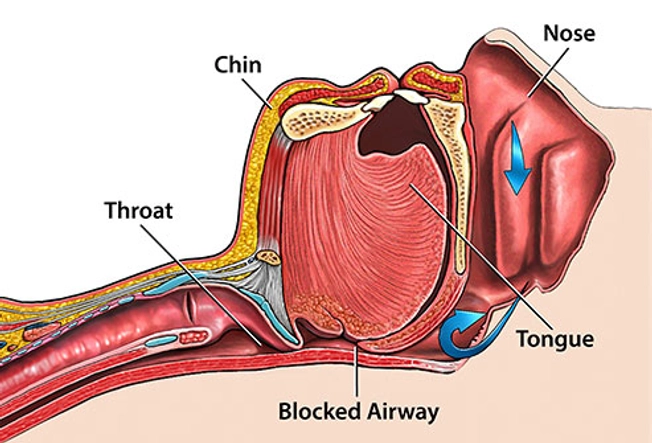Sleep Apnea and Treatment Methods
Sleep Apnea is a condition that affects a person’s breathing while they sleep. With Sleep Apnea, individuals may stop breathing several times during their sleep, called "Interruptions", in which the brain wakes up the body to restart breathing. In severe cases of Sleep Apnea, a person may wake up over 50 - 100 times a night!

The Two Main Types of Sleep Apnea
 Obstructive Sleep Apnea : This is the most common type of Sleep Apnea and occurs when your upper airway becomes blocked while you sleep, reducing or completely stopping airflow. Anything that could narrow your airway such as large tonsils, obesity, and even changes in your hormone levels can increase your risk for Obstructive Sleep Apnea.
Obstructive Sleep Apnea : This is the most common type of Sleep Apnea and occurs when your upper airway becomes blocked while you sleep, reducing or completely stopping airflow. Anything that could narrow your airway such as large tonsils, obesity, and even changes in your hormone levels can increase your risk for Obstructive Sleep Apnea.
Central Sleep Apnea : Occurs when your brain does not send the signals needed to breathe while sleeping. This condition is different from Obstructive Sleep Apnea, because the Breathing is stopped from the throat muscles relaxing and blocking the Airway. Certain health conditions and medical problems can make it hard to breathe and affect how your brain controls your airway and chest muscles. Underlying medical conditions like CHF, elevated BMI, and frequent Narcotic use can significantly increase your risk for Central Sleep Apnea.
Treatment Methods
Sleep Apnea can alter your physical and mental health over time, but it is a treatable condition. To properly treat OSA, it is important to fully understand the condition and how it affects your daily life. Get to know the facts so you and your loved ones can look out for the signs and symptoms associated with Sleep Apnea.
Treatment for sleep apnea can include changing your diet, exercise, in conjunction with using therapy machines, such as a continuous positive airway pressure (CPAP), or (BiPAP), bilevel positive airway pressure machines. CPAP and BiPAP are two types of ventilators that help with breathing and help push air into your lungs. You are then fitted with a mask or nasal plugs that connect via tubing to the ventilator.
While you sleep, the ventilator carefully supplies pressurized air into your airways. We call this “positive pressure ventilation” because the device opens your lungs with this “positive” air pressure. If you have trouble breathing during sleep, studies show a BiPAP machine can help significantly in supplying air, so you can rest comfortably and wake up less. While using a BiPap machine, you will receive positive pressurized air, when you breathe in and when you breathe out but the air pressure is higher when breathing in.
BiPAP machines differ from continuous positive airway pressure (CPAP) machines in the way that CPAP devices deliver the SAME amount of pressure as you breathe in and out. Depending upon your existing medical conditions, you may respond better to BiPAP versus CPAP, or vice versa. Your Healthcare provider can help you pick the right type of therapy device best suited for your needs.
Before you start Therapy, your machine will also need to be calibrated. Your provider can set you up with a Sleep Specialist that will adjust the settings accordingly, so that you receive the appropriate therapy. Your Specialist may also have you try on several different types of masks and nasal plugs before deciding on the one you like best. It’s important to have a good mask seal to prevent air leaking, during the night. If your mask feels too tight, too loose or is noisy, you may need to have it refitted. Your Sleep Specialist will show you how to prepare for your BiPap or CPAP therapy, hook up your machine, and give detailed instructions on how to clean your masks, tubing, and other parts of your device.
Benefits Of An At-Home Sleep Study
At-home sleep tests are a great way to figure out what’s happening while we slumber – without ever having to step foot in a lab, hospital, or healthcare clinic! A sleep study will help diagnose any underlying causes of your sleep problems. Thanks to modern technology, we can now conduct at-home studies efficiently and quickly. At Home Sleep Tests are easy to use, with minimal setup, allowing us to diagnose sleeping problems swiftly, accurately and with the help of a doctor’s prescription!
 PROS
PROS
- Faster Results! Recieve your test results in just ONE Night of Sleep.
- Home sleep tests are cheaper than lab tests.
- Improving your sleep can improve your quality of life. A sleep test is the first step.
CONS
- Taking your Sleep Test in a Lab may not be the most comfortable and getting to sleep may be difficult.
- In- Lab Tests can turn out to be more expensive.
- There may be extra fees associated with obtaining and discussing results.
- Lab Tests can also be more intrusive, requiring multiple trips to achieve certain results.

Our at Home Sleep Test Results give a complete comprehensive Assessment that tells your Doctor and Providers everything they need to know about your Sleep Patterns. You’ll be provided an easy-to-use device and straightforward instructions, With Tele-Health Appointment Included, ensuring better accuracy and understanding than ever before.